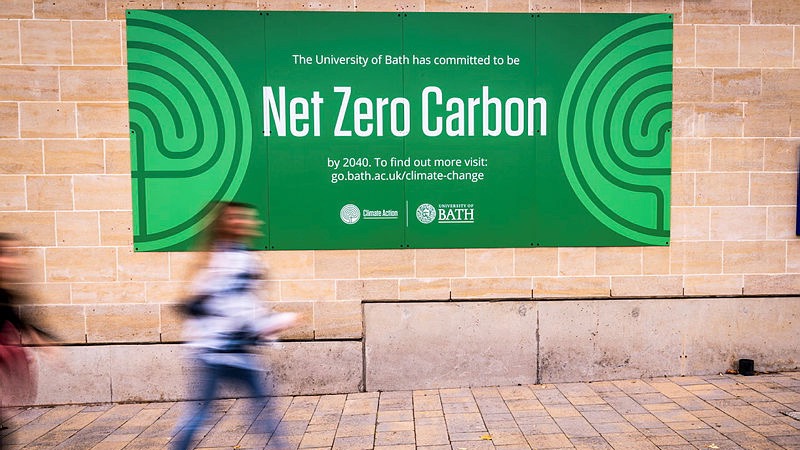Since the University declared a climate emergency in May 2020, we've begun our climate action journey through a joined-up, whole institution response as represented through the 11 Climate Action Framework (CAF) Principles. The Principles and our approach were created through consultation with our whole community, and staff and students continue to believe in this vision, supporting strong action across all aspects of university life.
The University's vision covers four thematic work areas as covered in this latest report:
- education – empowering students as change makers for climate change
- research – delivering solutions to tackle the climate emergency
- footprint – reducing our footprint to net zero carbon emissions by 2040
- partnerships – working to bring wider societal transformation in response to the climate crisis
In the full report, you can read in detail about the actions being taken in each of these areas with case studies to showcase the breadth and depth of how climate action is being embedded into university life. Below we've shared just a few highlights from each of the thematic areas, which exemplify the University's good first steps on our transition to becoming a low carbon campus and delivering on our commitments and CAF principles. The process of change is complex though and within the report it details areas in which the University understands the magnitude of the challenges ahead but where work has only just begun. With this clear understanding, the University is now in a position to start embedding real change.
Education
- Climate Literacy was offered to all incoming students as part of induction and was attended by more than 1000 students
- We're actively collaborating for quality sustainability learning and, in 2022, joined with 10 other universities, led by De Montfort University, to deliver a Collaborative Enhancement Project focused on Education for Sustainable Development (ESD) and academic quality, funded by QAA (read the case study on page 13)
- As part of work to embed climate in existing courses, we're also developing new ones such as the MSc Zero Carbon Futures course which is launching in 2024
- Our students and graduates are making real-world impacts for carbon reduction and sustainability, such as the LabCycle initiative lead by graduate Jinghui Liang fighting plastic waste in labs (read the case study on page 16)
Research
- Sustainability is one of the University’s three key research themes and ground-breaking work is taking place across the spectrum of disciplines covered by our research, with experts researching solutions to the climate crisis from multiple angles
- The Institute for Sustainability launched in 2023, adding to the University's other world-leading research institutes and centres addressing climate change and sustainability challenges
- The University's LEAF (Laboratory Efficiency Assessment Framework) pilot has been extended and now includes more than 50 labs across eight departments, with a great achievement this year including the turning up 24 ultra-low temperature freezers (read the case study on page 25)
- Professor Lorraine Whitmarsh contributed to a climate-focused House of Lords report and to Greta Thunberg’s Climate book, and was awarded an MBE in recognition of her work on behaviour change and public engagement toward a sustainable future (see feature on page 20)
Footprint
- Our total carbon footprint for 2021/22 is down 1% compared to the previous year, with Scope 1 and 2 emissions down 20% in that time, and down by 47% since 2005 (see full footprint data on page 28)
- Scope 3 measurement and supply chain engagement work continue to be at vanguard of sector (read the case study on page 38), with a GW4 pilot project lead by Bath
- We launched our Sustainable Food Commitment, with key achievements this year including the roll-out of our Exchange Cup Scheme and dropping the 40p supplement for oat and soy milk in hot drinks (read the case study on page 39)
- The Business and Travel Expenses Policy has been updated to give carbon consideration greater priority in decision making so that the majority of staff will now travel by train or bus instead of plane in the UK
- We're piloting low carbon consideration in tenders (read the case study on page 36)
Partnerships
- ActNowFilm2 was produced in partnership with Cambridge Zero, ForAfrika, Global Alliance of Universities on Climate (GAUC) and Plant-for-the-Planet (read the case study on page 43)
- A new collaborative project was launched with B&NES council on sustainable construction (read the case study on page 41)
Organisational change
- The Climate Action Survey, conducted in November 2022 in collaboration with the Psychology Department, again showed broad support from staff and students for climate action across all areas of university life with results of this survey shared in a blog series
- A pilot scheme to recruit departmental ‘Climate Advocates’, staff with specific terms of reference and workload allowance, has launched in the Faculty of Engineering and Design and the Department of Life Sciences
- All papers to Council and University Executive Board now require a consideration of how the proposed change impacts the CAF Principles and we're piloting a Climate Impact Assessment tool to support individuals in this process
Students' Union
Included in their top ten issues for this year, the SU called on the University to "demonstrably respond with scale and urgency to the climate emergency, and to increase the use of transparent and credible sustainability impact statements in decision-making.”
In parallel with the University, they have taken action to reduce their environmental impact while also supporting students to change behaviours and to lead climate action projects of their own.

